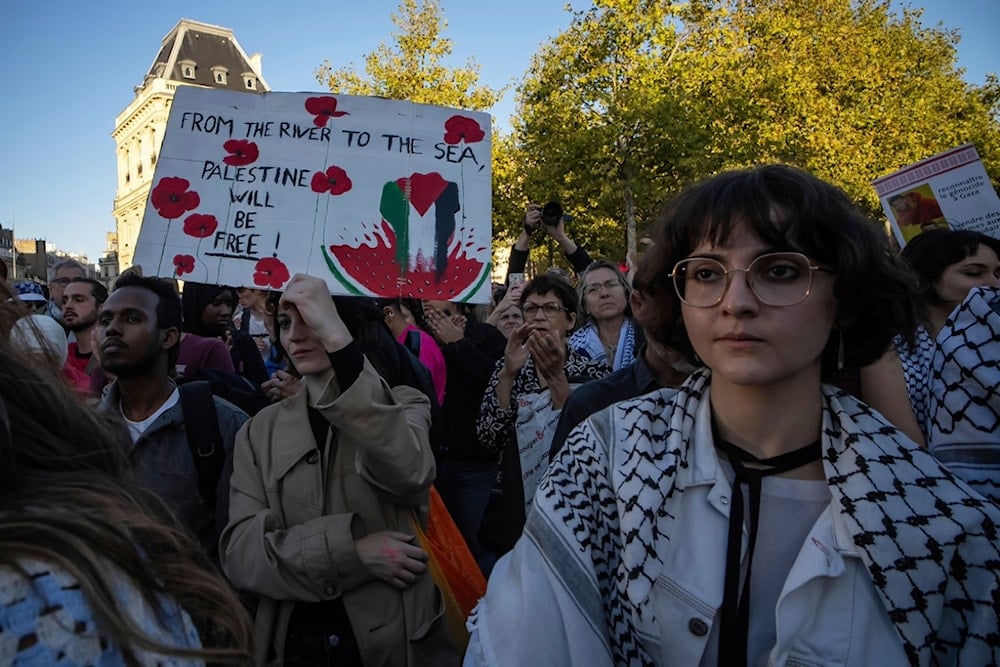France expects Israeli backlash after Macron backs Palestinian state
France braces for Israeli retaliation after Macron’s move to recognize a Palestinian state at the UN, with Tel Aviv mulling annexations and consulate closures.
-

A woman holds a banner reading 'From the river to the sea, Palestine will be free' during a pro-Palestinian gathering at Republic Square, in Paris, Wednesday, September 17, 2025. (AP)
Paris is preparing for potential Israeli reprisals after President Emmanuel Macron announced that France, alongside several other countries, will recognize Palestinian statehood during the UN General Assembly on Monday.
According to two European officials and a source familiar with Israeli government deliberations who spoke to Politico, "Israel" is weighing several responses. Options reportedly under discussion include accelerating annexation plans in the West Bank, closing France’s historic consulate in occupied al-Quds, and encroaching on French-owned sites such as the Sanctuary of the Eleona, a Christian pilgrimage complex on the Mount of Olives.
Israeli police entered the Eleona compound last year, sparking a diplomatic dispute between Paris and Tel Aviv. Deputy Foreign Minister Sharren Haskel told French radio earlier this month that shuttering the French diplomatic outpost in occupied al-Quds, which predates the establishment of the Israeli regime in 1948, “was on the table of the prime minister.”
A source cited by Israeli media said the question was not if, but how forcefully, the Israeli occupation would retaliate, underscoring that Prime Minister Benjamin Netanyahu’s government aims to resist international pressure on Palestinian matters.
Diplomatic friction deepens
Karim Amellal, a former French ambassador focused on Mediterranean affairs, warned that “Israel won’t stop at anything in terms of retaliation.” A European diplomat predicted that ties between Paris and Tel Aviv would “deteriorate enormously,” noting that Macron has been at the forefront of the statehood initiative.
Macron surprised partners and critics alike over the summer by pledging to recognize a Palestinian state, becoming the highest-profile Western leader to do so. Canada, Australia, and the United Kingdom have also moved toward recognition ahead of a two-state solution conference at the UN.
In an interview with Channel 12, Macron argued that recognizing Palestinian statehood was the “best way to isolate Hamas,” while warning that settlement expansion in the West Bank would be “unfair and irresponsible.”
Wider European pressure
The statehood drive coincides with new EU measures targeting “Israel” over its actions in Gaza. European Commission President Ursula von der Leyen recently announced plans for tariffs and sanctions, prompting Foreign Minister Gideon Sa'ar to accuse Brussels of “empowering terrorist groups.”
“Israel” and the United States contend that recognition rewards Hamas, which they blame for the October 7 attack, and undermines negotiations for the release of hostages in Gaza.
Relations between Paris and Tel Aviv, already strained by Macron and Netanyahu’s personal clashes, have been further complicated by debates over antisemitism in France. Netanyahu accused Macron of fueling an “antisemitic fire,” prompting a strong rebuttal from the French president.
According to Le Figaro, Paris is also weighing countermeasures, including the closure of an Israeli consulate in France and the expulsion of Israeli intelligence operatives.

 3 Min Read
3 Min Read








